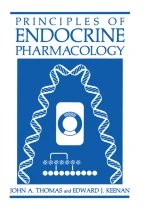Effects of Drugs on the Endocrine System

Several synthetic steroids and hormonally active substances are able to affect the endocrine system. In such cases, the substance may possess inherent hormonal activity and therefore act rather specifically on a particular target organ of the endocrine system. Some of the so-called 19-norsteroids can effectively inhibit ovulation (e. g., norethynodrel) or can enhance protein-anabolic activity (e. g., norethandrolone). While these steroids are, in fact, drugs, they nevertheless possess inherent hormonal activity. On the other hand, drugs without inherent hormonal activity are able to affect particular target organs of the endocrine system. Some of these drugs are used for the explicit purpose of affecting an endocrine process, while still others affect a hormonal action, usually as a result of some side effect or toxic reaction. Several antithyroidal agents have no inherent hormonal activity, yet exert pharmacological effects on the endocrine system. Conversely, several CNS-depressant drugs without inherent hormonal activity are capable of affecting hormonal balance as a result of some side effect, or their ability to interfere with hypothalamic-pituitary relationships.
This is a preview of subscription content, log in via an institution to check access.
Access this chapter
Subscribe and save
Springer+ Basic
€32.70 /Month
- Get 10 units per month
- Download Article/Chapter or eBook
- 1 Unit = 1 Article or 1 Chapter
- Cancel anytime
Buy Now
Price includes VAT (France)
eBook EUR 42.79 Price includes VAT (France)
Softcover Book EUR 52.74 Price includes VAT (France)
Tax calculation will be finalised at checkout
Purchases are for personal use only
Preview
Recommended Readings
- Arena, J. M., Drugs and chemicals excreted in breast milk, Pediatr. Ann.9:15, 1980. Google Scholar
- Barber, H. R. K., The effect of cancer and its therapy upon fertility, Int. J. Fertil.26:250, 1981. PubMedCASGoogle Scholar
- Brater, D. C., Drug-drug and drug-disease interactions with nonsteroidal anti-inflammatory drugs, Am. J. Med.80:62, 1986. ArticlePubMedCASGoogle Scholar
- Cohen, K. L., Metabolic, endocrine and drug-induced interference with pituitary function tests: A review, Metabolism26:1165, 1977. ArticlePubMedCASGoogle Scholar
- Elias, A. N., Gwinup, G., Effects of some clinically encountered drugs on steroid synthesis and degradation, Metabolism29:582, 1980. ArticlePubMedCASGoogle Scholar
- Fody, E. P., and Walker, E. M., Effects of drugs on male and female reproductive systems, Ann. Clin. Lab. Sci.15:451–458, 1985. PubMedCASGoogle Scholar
- Horowitz, J. D., and Goble, A. J., Drugs and impaired male sexual function, Drugs18:206, 1979. ArticlePubMedCASGoogle Scholar
- Ribelin, W. E., The effects of drugs and chemicals upon the structure of the adrenal gland, Fund. Appli. Toxicol.4:105, 1984. ArticleCASGoogle Scholar
- Roeser, R. A. P., Stocks, A. E., and Smith, A. J., Testicular damage due to cytotoxic drugs and recovery after cessation of therapy, Aust. N. Z. J. Med.8:250, 1978. ArticlePubMedCASGoogle Scholar
- Sandow, J., Toxicological evaluation of drugs affecting the hypothalamic-pituitary system, Pharmacol. Ther.5:297, 1979. ArticleCASGoogle Scholar
- Steinberger, E., The etiology and pathophysiology of testicular dysfunction in man, Fertil. Steril.29:481, 1978. PubMedCASGoogle Scholar
- Stockley, I. H., Mechanisms of drug interaction, Am. J. Hosp. Pharmacol.27:977, 1970. CASGoogle Scholar
- Thachib, J. V., Jewett, M. A. S., and Rider, W. D., The effects of cancer and cancer therapy on male fertility, J. Urol.126:141, 1981. Google Scholar
- Thomas. J., Reproductive hazards and environmental chemicals: A review, Toxic Subst. J.2:318, 1981. CASGoogle Scholar
- Thomas, J. A., Korach, K. S., and McLachlan, J. A., (ed), Endocrine Toxicology, Target Organ Toxicology Series, Raven Press, New York, 1985. Google Scholar
- Thomas, J. A., Shahid-Salles, K. S., and Donovan, M. P., Effects of narcotics on the reproductive system. Regulatory mechanisms affecting gonadal hormone action, in: Advances in Sex Hormone Research (J. A. Thomas, and R. L. Singhal, eds.) Vol. 3, University Park Press, Baltimore, p. 69, 1977. Google Scholar
Author information
Authors and Affiliations
- Corporate Research, Travenol Laboratories, Inc., Round Lake, Illinois, USA John A. Thomas ( Vice President, Adjunct Professor, Lecturer, Instructor )
- Department of Pharmacology, Northwestern University School of Medicine, Chicago, Illinois, USA John A. Thomas ( Vice President, Adjunct Professor, Lecturer, Instructor )
- Department of Urology, Northwestern University School of Medicine, Chicago, Illinois, USA John A. Thomas ( Vice President, Adjunct Professor, Lecturer, Instructor )
- Department of Pharmacology and Toxicology, West Virginia School of Medicine, Morgantown, West Virginia, USA John A. Thomas ( Vice President, Adjunct Professor, Lecturer, Instructor )
- Department of Pharmacology, University of Illinois School of Medicine, Chicago, Illinois, USA John A. Thomas ( Vice President, Adjunct Professor, Lecturer, Instructor )
- Department of Pharmacology, Rush-Presbyterian School of Medicine, Chicago, Illinois, USA John A. Thomas ( Vice President, Adjunct Professor, Lecturer, Instructor )
- Hormone Receptor Laboratory, School of Medicine, The Oregon Health Sciences University, Portland, Oregon, USA Edward J. Keenan ( Director, Associate Professor, Assistant Professor, Adjunct Associate Professor )
- Department of Surgery, School of Medicine, The Oregon Health Sciences University, Portland, Oregon, USA Edward J. Keenan ( Director, Associate Professor, Assistant Professor, Adjunct Associate Professor )
- Department of Pharmacology, School of Medicine, The Oregon Health Sciences University, Portland, Oregon, USA Edward J. Keenan ( Director, Associate Professor, Assistant Professor, Adjunct Associate Professor )
- Department of Medicine (Medical Oncology), School of Medicine, The Oregon Health Sciences University, Portland, Oregon, USA Edward J. Keenan ( Director, Associate Professor, Assistant Professor, Adjunct Associate Professor )
- John A. Thomas

